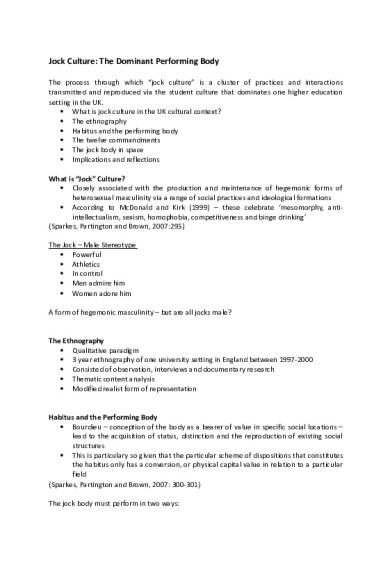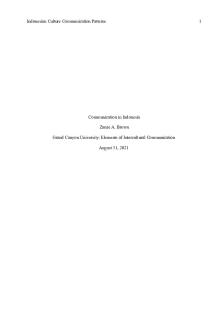Jock Culture PDF

| Title | Jock Culture |
|---|---|
| Author | Holly Reynolds |
| Course | Sociology of Sport and Physical Culture |
| Institution | Cardiff Metropolitan University |
| Pages | 6 |
| File Size | 221.1 KB |
| File Type | |
| Total Downloads | 64 |
| Total Views | 152 |
Summary
Download Jock Culture PDF
Description
Jock Culture: The Dominant Performing Body The process through which “jock culture” is a cluster of practices and interactions transmitted and reproduced via the student culture that dominates one higher education setting in the UK. What is jock culture in the UK cultural context? The ethnography Habitus and the performing body The twelve commandments The jock body in space Implications and reflections What is “Jock” Culture? Closely associated with the production and maintenance of hegemonic forms of heterosexual masculinity via a range of social practices and ideological formations According to McDonald and Kirk (1999) – these celebrate ‘mesomorphy, antiintellectualism, sexism, homophobia, competitiveness and binge drinking’ (Sparkes, Partington and Brown, 2007:295) The Jock – Male Stereotype Powerful Athletics In control Men admire him Women adore him A form of hegemonic masculinity – but are all jocks male?
The Ethnography Qualitative paradigm 3 year ethnography of one university setting in England between 1997-2000 Consisted of observation, interviews and documentary research Thematic content analysis Modified realist form of representation
Habitus and the Performing Body Bourdieu – conception of the body as a bearer of value in specific social locations – lead to the acquisition of status, distinction and the reproduction of existing social structures This is particulary so given that the particular scheme of dispositions that constitutes the habitus only has a conversion, or physical capital value in relation to a particular field (Sparkes, Partington and Brown, 2007: 300-301) The jock body must perform in two ways:
1. In sport 2. Socially in order to create capital and convert into this jockey identity The Emergence of Transmission of Jock Culture at Greenfields ‘The habitus-embodied history, internalised as a second nature and so forgotten as-history-is the active present of the whole past of which it is a product.’ (Bourdieu, 1990:5)
Interview from former student and lecturer at Greenfields Greenfields have been playing rugby since it opened – due to drive of the Principal soon after the War, is because a hot bed for rugby Principle was nuts on rugby, a rugby referee – would go to Wales and recruit players Joke – ‘if you had 3 and a half ‘O’ levels and a Welsh cap, you could get into Greenfields Interviewees own entrance to Greenfields was very much centred around rugby football ‘Macho, drunken, beer swilling, womanising people…the whole thing was just topflight sport…in some ways they trained the behaviour of the following 18 year olds.’ Recollection of Initiation into the Greenfields 1st XV in 1958 Stood on table, not just rugby club but all locals surrounding – starting to sing ‘Amazing Grace’ Soaked in beer – just threw their pints over him – had to sing the dirtiest song he knew Didn’t have to do it – not strong enough, lack willpower
Interpretations – the gendered habitus of students in this era appears to maintain links to those of the current day Greenfields students through a range of social practices and hierarchical orderings The ‘12 Commandments’ of Jock Culture (The Unwritten Rules) Jock culture at Greenfields appears to be primarily an embodied cultural history whose principle channel of transmission is through the schemes of dispositions that are embedded in a legitimate jock habitus and passed on to the next generation 1. Play high-level university (BUSA) sport 2. Choose your sport wisely 3. Only exceptional Freshers make the first team 4. Be committed to the social life 5. Excessive alcohol consumption and associated behaviours are obligatory 6. Respect the hierarchy 7. Stay established 8. Look like a jock 9. Attend socials regularly 10. Attend post-match drinking sessions 11. Credit for time served 12. Gain positions of power
Becoming a ‘Jock’ Through Practice of the 12 Commandments What is cut at the cutting edge is the future. Through practice we ‘become’ – there is no standing still – practice takes time, it relates past, present and future to bring some future into being (Parker, 2000, p.44)
These practices can be seen as ‘structured’ – rather than being external and written on a tablet in the form of their Christian referent, they are contained within the practical cultural logics of the embodied dispositions demonstrated by the established members of this culture (both the insiders, and to a lesser extent, outsiders who also have ‘feel for the game, but as sidelined by it) – these dispositional logistics give rise to a generative grammar of ‘active possibilities’ for those who have acquired them. (Sparkes, Partington and Brown, 2007: 305)
Consequences Shift in the fraternity structure This core dominant culture positions others in social space and time in relation to itself ‘Distinction’ of performing jock bodies and othering - Jocks - Sport scholars - Also rans - Anti jocks - Wannabes
-
Broken jocks Non-jocks
Jock Bodies in Social Space Social Space: Interaction, Practice and Gender Spaces are processual and relationally ordered systems (Löw, 2006) Investigating the topological dimensions of one or more cultures no longer means ‘observing the way structures are ordered in space but looking at how these structures form spaces’ (p.20) Over time, structured social spaces like Greenfields turn into a place with an identity, locality or community. They defined this as simultaneously being ‘a demarcated physical space’ and ‘clusters of interaction’ (p.8).Both of which are constructed from the particularities of its underlying structured spatial formations. (Gupta and Ferguson, 1992) ‘Interspace’ and Social Difference Developing Merleau Ponty’s articulation of interspaces (spaces between bodies) – Bourdieu (1998) saw the key socio-spatial dynamic as that relating to difference, or gap. (Sparkes, Brown and Partington, 2010, p.335) Bourdieu suggest that it is the difference or gap between spaces (interspaces) that provides the momentum for action and interpretation. (Sparkes, Brown and Partington, 2010, p.335) A set of distinct and coexisting positions which are exterior to one another and which are defined in relation to one another through their mutual exteriority and their relations of proximity, vicinity, or distance as well as through relations of order, such as above, below, between. (Bourdieu, 1998, p.9)
Groupings in Space – Embodied Identity Positions in Jock Culture
The Elite Space: The Sport Scholars Stress on performance outcomes Subjected to official surveillance Often physically removed or absent from the core jock ritual spaces Convert physical capital into economic capital Provided with resources (sport sciences support etc) Serious ‘not’ fun Often unable or not eligible to place for BUSA ‘Sport scholars occupy the elite space and are afforded significant status. The space they occupy in relation to jock culture is a curious one as they are not able to adhere to all of the ‘twelve commandments’ and this militates against their full inclusion into its core’ (Sparkes, Brown and Partington, 2010:337) Sports scholar recognise that they are different from the jocks and can articulate this difference: Jocks – orientated around getting drunk, performing university sport and having a laugh Scholars – cannot do that, you go away, you perform and come back - You’re not allowed to go out, you’re not allowed to get drunk, you have to be careful what you eat - Occupy a different social space – at once distinguished but side-lined – never really come to embody jock culture as part of their habitus due to their absence from other key spaces The Excluded Space: The Also-Rans Do not have their identity confirmed by the subculture and are effectively excluded Some may seek confirmation despite initial rejection Differ from the non-jocks because they are sports scientists Lack of presence on a team closes down participation in training sessions, initiation rituals, and other informal processes of socialisation that jocks undergo as a collective Have a spoiled identity – only made obvious if in the same physical spaces as jocks Antagonistic Space: The Anti-Jocks Do not possess the physical capital to be sport scholars – but have the ability to play for BUSA teams and meet Commandments 1 and 2 – however, they choose to break some of the other commandments There are consequences for anti-jocks who make such a stand – include team demotion, or being dropped altogether, and excludes them from certain social spaces Are not completely shunned by the jocks – possess sufficient physical capital
Unlike also-rans – are not excluded from social spaces occupied by jocks, but are normally either placed or place themselves, symbolically and physically on the margins of these spaces.
Authorised Space: The Wannabes Are able to join this culture as long as they have sufficient physical capital and are prepared to adopt the values and behaviours of jocks The ‘Othered’ Space: The Non-Jocks Majority of students not taking a sports science degree are rejected by jocks at Greenfields – in turn, they reject jock culture Jock culture ‘needs’ non-jocks as a group against which to define their own identity boundaries in the physical and symbolic social space by using ‘them’ as a public reference point to highlight what ‘we’ are not Non-jocks have their own uniform that distinguishes them from the jocks - Often complain about the jock domination Even though some non-jocks do take part in university sport, they do not integrate themselves into the jock culture as their commitments are to teaching rather than to the team Reflections The notion of space contains, in itself, the principle of a relational understanding of the social world (Bourdieu, 1998, p.310) Only one illustration of a jock culture reconstructing itself through practice Cannot extrapolate these insights in any predictive way Issues of accommodation of the Other, gender power/complicity/symbolic violence and resistance These social spaces are constitutive of the space at Greenfields These spaces are fluid/temporary not fixed Is the gender order in this context really challenged?...
Similar Free PDFs

Jock Culture
- 6 Pages

Culture
- 2 Pages

Virtual Culture
- 3 Pages

La culture
- 9 Pages

DAMAGED CULTURE
- 1 Pages

Indonesian culture
- 6 Pages

Ob culture
- 8 Pages

Culture notes
- 4 Pages

Culture Jamming
- 3 Pages

Cop Culture
- 4 Pages

Culture notes
- 23 Pages

Culture & Ideology
- 2 Pages

Dossier Culture
- 24 Pages
Popular Institutions
- Tinajero National High School - Annex
- Politeknik Caltex Riau
- Yokohama City University
- SGT University
- University of Al-Qadisiyah
- Divine Word College of Vigan
- Techniek College Rotterdam
- Universidade de Santiago
- Universiti Teknologi MARA Cawangan Johor Kampus Pasir Gudang
- Poltekkes Kemenkes Yogyakarta
- Baguio City National High School
- Colegio san marcos
- preparatoria uno
- Centro de Bachillerato Tecnológico Industrial y de Servicios No. 107
- Dalian Maritime University
- Quang Trung Secondary School
- Colegio Tecnológico en Informática
- Corporación Regional de Educación Superior
- Grupo CEDVA
- Dar Al Uloom University
- Centro de Estudios Preuniversitarios de la Universidad Nacional de Ingeniería
- 上智大学
- Aakash International School, Nuna Majara
- San Felipe Neri Catholic School
- Kang Chiao International School - New Taipei City
- Misamis Occidental National High School
- Institución Educativa Escuela Normal Juan Ladrilleros
- Kolehiyo ng Pantukan
- Batanes State College
- Instituto Continental
- Sekolah Menengah Kejuruan Kesehatan Kaltara (Tarakan)
- Colegio de La Inmaculada Concepcion - Cebu


